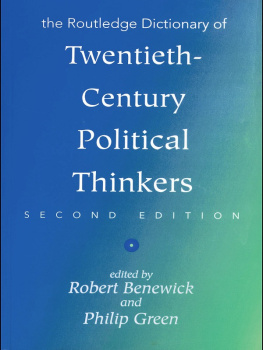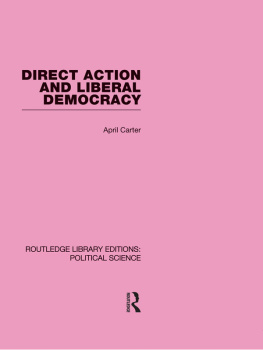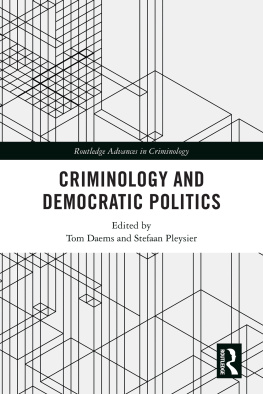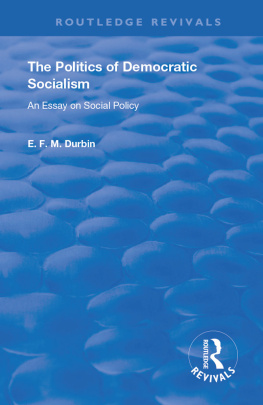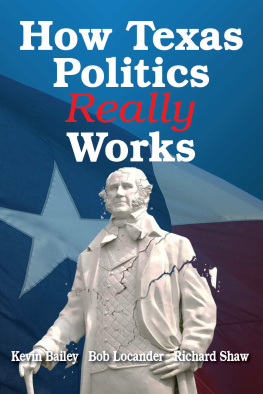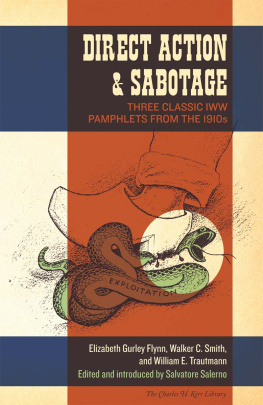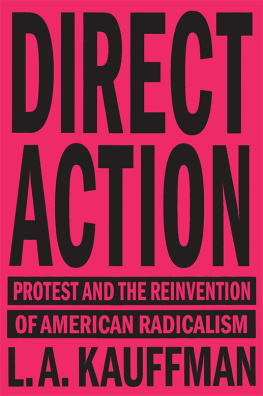ROUTLEDGE LIBRARY EDITIONS:
POLITICAL THOUGHT AND
POLITICAL PHILOSOPHY
Volume 5
DIRECT ACTION AND
DEMOCRATIC POLITICS
DIRECT ACTION AND
DEMOCRATIC POLITICS
Edited by
ROBERT BENEWICK AND
TREVOR SMITH
First published in 1972 by George Allen & Unwin Ltd.
This edition first published in 2020
by Routledge
2 Park Square, Milton Park, Abingdon, Oxon OX14 4RN
and by Routledge
52 Vanderbilt Avenue, New York, NY 10017
Routledge is an imprint of the Taylor & Francis Group, an informa business
1972 George Allen & Unwin Ltd
All rights reserved. No part of this book may be reprinted or reproduced or utilised in any form or by any electronic, mechanical, or other means, now known or hereafter invented, including photocopying and recording, or in any information storage or retrieval system, without permission in writing from the publishers.
Trademark notice: Product or corporate names may be trademarks or registered trademarks, and are used only for identification and explanation without intent to infringe.
British Library Cataloguing in Publication Data
A catalogue record for this book is available from the British Library
ISBN: 978-0-367-21961-1 (Set)
ISBN: 978-0-429-35434-2 (Set) (ebk)
ISBN: 978-0-367-22555-1 (Volume 5) (hbk)
ISBN: 978-0-429-27561-6 (Volume 5) (ebk)
Publishers Note
The publisher has gone to great lengths to ensure the quality of this reprint but points out that some imperfections in the original copies may be apparent.
Disclaimer
The publisher has made every effort to trace copyright holders and would welcome correspondence from those they have been unable to trace.
Direct Action
and Democratic
Politics
edited by
ROBERT BENEWICK and TREVOR SMITH
First published in 1972
This book is copyright under the Berne Convention. All rights are reserved. Apart from any fair dealing for the purpose of private study, research, criticism or review, as permitted under the Copyright Act, 1956, no part of this publication may be reproduced, stored in a retrieval system, or transmitted, in any form or by any means, electronic, electrical, chemical, mechanical, optical, photocopying, recording or otherwise, without the prior permission of the copyright owner. Enquiries should be addressed to the publishers.
George Allen & Unwin Ltd 1972
ISBN 0 04 350040 4 hardback
0 04 350041 2 paperback
Printed in Great Britain
in 10 point Plantin type
by Alden & Mowbray Ltd
at the Alden Press, Oxford
CONTENTS
I Patterns of Protest in English History
V. G. KIERNAN
II The Threshold of Violence
ROBERT BENEWICK
III Liberal Rationality and Political Violence
BHIKHU PAREKH
IV Three Languages of Change: Democracy, Technocracy and Direct Action
ELIZABETH VALLANCE
V The Study of Violence
ROBIN JENKINS
VI Law and Order in Comparative Perspective
ROBERT MAST
VII The Second Ulster Crisis
ROBERT BAXTER
VIII Race Relations in British Politics
HANNAN ROSE
IX Black Consciousness
ALEXANDER KIRBY
X From Civil Disobedience to Confrontation
PETER CADOGAN
XI Remember Your Humanity and Forget the Rest
GEORGE CLARK
XII Direct Action and the Springbok Tours
PETER HAIN
XIII Universities and Violence
BRIAN MACARTHUR
XIV Policy-Making
DAVID G. T. WILLIAMS
XV The Use and Control of the Police
PETER MOODIE
XVI Political Parties and Members of Parliament
GAVIN DREWRY
XVII The Role of the National Council for Civil Liberties
TONY SMYTHE
XVIII Direct Action, Democratic Participation and the Media
NICHOLAS GARNHAM
XIX Protest and Democracy
TREVOR SMITH
Direct action is a traditional and legitimate form of political behaviour in a democratic State. Ruling groups have rarely released or shared their power with others voluntarily. Institutional changes have seldom occurred in the absence of pressure. New policies and programmes have been introduced frequently by means outside the conventional boundaries of Parliamentary politics. As new demands and needs arise, their advocates have resorted to direct action in order to achieve recognition, participation and acceptance in the political system. When more established groups perceive the system as unresponsive or ineffective, they may well adopt more militant tactics to articulate their grievances. And although it is sad commentary, it is often through forms of direct action that the moral basis of politics is kept before the government and the public.
The political and industrial development of Britain, even though it has been more continuous and less cataclysmic than most nations, provides an impressive illustration of the role of direct action. It also makes clear that government resistance is to be expected. However, the way in which a government views this form of political activity can further or restrict democratic politics. Fundamentally, a commitment and determination to come to grips with the structural defects of society will be its most effective deterrent. Short of this, the response will be contingent upon the purpose and methods employed by those groups that undertake direct action. That is, whether the issue is considered resolvable within the existing system, necessitates changes in the system or demands its abolition. Thereafter, assuming the absence of a revolutionary situation, the choice among the options available to a government is dependent upon the ideological predis-positions and political priorities of both the government and the direct actionists.
The wave of political unrest in recent years has inclined the British government in a restrictive direction. This, like direct action itself, has been encouraged as much by events abroad as by those at home. It also suggests an interpretation of democracy which discounts conflict and places it on a parity with efficacy and stability. For a nation so bound up in traditions, it is ironical that one of its most distinctive features can so easily be ignored. Part of the explanation lies in the technocratic and consensual approaches to politics, also borrowed from abroad in the late 1950s and early 1960s. The divisive features of British society were seen as disappearing, class conflict was dismissed as a relic of history, and party disputes were treated more as matters of personalities and images rather than of policies. With increasing confidence gained from the availability of intellectual skills and technocratic hardware, politics was viewed as a process for making adjustments to commonly accepted policies, for tinkering with institutions and for mopping-up marginal areas of deprivation. Economic growth, Parliamentary reforms, and progress in general were questions of technique. Ideology was deemed to have been replaced by consensus in domestic politics and by a growing convergence in international politics.
The response to the Campaign for Nuclear Disarmament, particularly on the part of political scientists, was indicative of this phenomenon. Rather than exploring the implications of its affinities with the nineteenth-century mass movements, the Campaign was regarded as a deviant case in contemporary political behaviour. Since its demands could not be accommodated within the realm of conventional pressure group politics, it was treated as a paradigm of a cause having no influence and thereby forced to rely on the mass demonstration. (We now know that the Aldermaston marches made it possible for serious discussion to take place in Whitehall.) Little attention was paid to the nature of the issues raised and the currents of thought represented, so that the possible inferences that could be drawn about the morality as well as the realities of a democratic political system were ignored.





